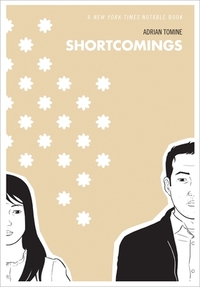Take a photo of a barcode or cover
One of the tougher graphic reads I've ever gotten through, but also one of the most rewarding. Tomine's simple artwork allows the reader to easily step into his Pacific Northwest world; it's the characters who are more troubling. Never given the quirks or sweetness that often populate graphic work, Ben Tanaka and his friends are grappling with big issues of gender, sexuality, race and stereotype, just as they enter the whirlwind period of their twenties, where it is difficult to express anything at all. Having the navel-gazing questions you are currently asking reflected back at you is food for thought, but not something any of these people are ready to fully digest and give back.
None of them are happy--with themselves or each other--and investigate their discord through what they see in front of them: primarily that Ben is more attracted to white women than his own Asian American girlfriend. His best, and only, friend uses it for humor; his girlfriend uses it as an excuse to vaguely break up with him. And Ben uses it as a way to ford new territory without actively changing all that much around him, though he is displeased.
Tomine perfectly touches on the numerous silences that pervade our lives, some pointing to future disaster, many pointing to the true vulnerability that defines our lives. His most involving panels involve such silences between Tanaka and his girlfriend, the best coming as he drops her off at the airport and drives home while attempting to drink the coffee she left behind. If only he could show that same sense of need to all those around him, Ben might be better equipped to travel through this world. And more voluble about it.
None of them are happy--with themselves or each other--and investigate their discord through what they see in front of them: primarily that Ben is more attracted to white women than his own Asian American girlfriend. His best, and only, friend uses it for humor; his girlfriend uses it as an excuse to vaguely break up with him. And Ben uses it as a way to ford new territory without actively changing all that much around him, though he is displeased.
Tomine perfectly touches on the numerous silences that pervade our lives, some pointing to future disaster, many pointing to the true vulnerability that defines our lives. His most involving panels involve such silences between Tanaka and his girlfriend, the best coming as he drops her off at the airport and drives home while attempting to drink the coffee she left behind. If only he could show that same sense of need to all those around him, Ben might be better equipped to travel through this world. And more voluble about it.
I had heard of Tomine, but hadn't actually read any of his comics until a friend loaned me "Sleepwalk and Other Stories" and instantly decided I needed to read more of his work. "Shortcomings" confront a lot of interesting issues and intersections: race, gender, sexuality.
Race discussions in America tend to exclude East Asians, who often hold a model minority status. The representation of how different characters approach their racial and sexual identity was very well done from my perspective (but I'm also an upper middle class White lady so take my point of view on the "authenticity" of the issues with a whole mountain of salt). How personal, immediate, and local characters (and people) are willing to engage in race discussions is a major part of identity development. We get characters on different ends of the spectrum.
I wanted to punch Ben in the face throughout this novel and yet I was cheering for him to be better. I loved that it explored Ben's feelings about his relationship with a white woman (and his idolization of them) vs. his girlfriend's relationship with a White Man. When Ben brought up the power dynamics I kept wanting to yell "You're not wrong, you're just an asshole!". I'd love to see a comic from his girlfriend's point of view because in the end, we only have Ben's point of view. I loved his girlfriend and found myself nodding my head when she spoke. I know "geeky brooding film guy and long suffering girlfriend" are tropes but the context that Tomine puts them in is what intrigues me. THe characters frustrate me but I don't read comics like this to escape from reality. I read comics like "Shortcomings" because I want a different point of view.
One thing I love about Tomine is that he has the ability to be so true to life that even when there isn't really closure or that happy ending you keep hoping for, you don't feel angry. In real life, people rarely have epiphanies that maybe they're just as dysfunctional as everyone else, that maybe they're the asshole. I kept wanting Ben to realize his shortcomings but he never really did and I was oddly ok with that. I think leaving the conflicts around gender, sexuality, and race unresolved makes the comic richer. Tying up the issues neatly in the end would have felt trite. THese issues aren't solved, that's why talking about them can feel like beating your head against a wall.
On a side note: I was really happy that I could read the Japanese in the comic given that calling my Japanese skills atrocious would be the understatement of the century. I really liked Shortcomings though I know this isn't how a lot of other reviewers feel. The take away being, as it is from any review, that your milage may vary.
Race discussions in America tend to exclude East Asians, who often hold a model minority status. The representation of how different characters approach their racial and sexual identity was very well done from my perspective (but I'm also an upper middle class White lady so take my point of view on the "authenticity" of the issues with a whole mountain of salt). How personal, immediate, and local characters (and people) are willing to engage in race discussions is a major part of identity development. We get characters on different ends of the spectrum.
I wanted to punch Ben in the face throughout this novel and yet I was cheering for him to be better. I loved that it explored Ben's feelings about his relationship with a white woman (and his idolization of them) vs. his girlfriend's relationship with a White Man. When Ben brought up the power dynamics I kept wanting to yell "You're not wrong, you're just an asshole!". I'd love to see a comic from his girlfriend's point of view because in the end, we only have Ben's point of view. I loved his girlfriend and found myself nodding my head when she spoke. I know "geeky brooding film guy and long suffering girlfriend" are tropes but the context that Tomine puts them in is what intrigues me. THe characters frustrate me but I don't read comics like this to escape from reality. I read comics like "Shortcomings" because I want a different point of view.
One thing I love about Tomine is that he has the ability to be so true to life that even when there isn't really closure or that happy ending you keep hoping for, you don't feel angry. In real life, people rarely have epiphanies that maybe they're just as dysfunctional as everyone else, that maybe they're the asshole. I kept wanting Ben to realize his shortcomings but he never really did and I was oddly ok with that. I think leaving the conflicts around gender, sexuality, and race unresolved makes the comic richer. Tying up the issues neatly in the end would have felt trite. THese issues aren't solved, that's why talking about them can feel like beating your head against a wall.
On a side note: I was really happy that I could read the Japanese in the comic given that calling my Japanese skills atrocious would be the understatement of the century. I really liked Shortcomings though I know this isn't how a lot of other reviewers feel. The take away being, as it is from any review, that your milage may vary.
challenging
medium-paced
Plot or Character Driven:
Character
Strong character development:
Complicated
Loveable characters:
No
Diverse cast of characters:
Yes
Flaws of characters a main focus:
Yes
Quintessential work of the Asian-American male literary cannon.
I hated the main character, but that was sort of the point. His own hypocrisy was such a downfall. I feel like I've met way too many people like him.
A great companion on a train ride home from London. A sad story that I couldn’t put down.
challenging
dark
sad
fast-paced
Plot or Character Driven:
Character
Strong character development:
No
Loveable characters:
No
Diverse cast of characters:
Yes
Flaws of characters a main focus:
Yes
The good ol' sad guy protagonist of the 2000s. We do not miss you!
An excellent and thought-provoking graphic novel. Set in Berkeley and New York, the three main characters are Asian Americans dealing with issues of race, school, and career. All three of them have their shortcomings, and author Adrian Tomine has created characters that, if not totally likable, are believable. They aren't always truthful with each other or themselves and it's interesting to see how they resolve (and don’t resolve) certain plot points.
Most fascinating to me was how the racial politics were handled. This is where Tomine’s writing shines, as the characters’ views aren’t always what they seem; just as in real-life, there are differences between one’s words and one’s actions and the gray areas outnumber the black and whites.
I liked Tomine’s art as well, his restraint being his greatest strength. The scene where Ben sees his girlfriend off at the airport was done beautifully and wordlessly; then, when they revisit the scene later in the story, it’s retold through their words.
The only thing that kept me from giving this five stars is that I felt the story was a bit lacking and deserved a fuller and deeper look; not necessarily a clear-cut denouement, but at least a more fleshed-out dealing with the issues that were raised.
Most fascinating to me was how the racial politics were handled. This is where Tomine’s writing shines, as the characters’ views aren’t always what they seem; just as in real-life, there are differences between one’s words and one’s actions and the gray areas outnumber the black and whites.
I liked Tomine’s art as well, his restraint being his greatest strength. The scene where Ben sees his girlfriend off at the airport was done beautifully and wordlessly; then, when they revisit the scene later in the story, it’s retold through their words.
The only thing that kept me from giving this five stars is that I felt the story was a bit lacking and deserved a fuller and deeper look; not necessarily a clear-cut denouement, but at least a more fleshed-out dealing with the issues that were raised.





